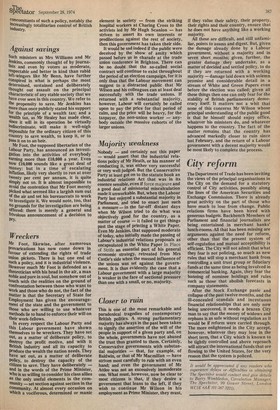Closer to ruin
This is one of the most remarkable and paradoxical tragedies of contemporary British politics. A strong parliamentary majority has always in the past been taken to signify the assertion of the will of the people in support of a given party and, on the whole, governments have not abused the trust thus granted to them. Certainly, Conservative governments with substantial majorities — that, for example, of Baldwin, or that of Mr Macmillan — have striven most carefully to rule with an even hand; and even the government of Mr Attlee was not an excessively immoderate one. What must, however, now be clear to' most citizens is that, if they desire a' government that leans to the left, if they wish to continue Mr Wilson in his employment as Prime Minister, they must, if they value their safety, their property, their rights and their country, ensure that he does not have anything like a working majority.
All these are difficult, and still unfamiliar, points to assess and digest. But, given the damage already done by a Labour government, without a majority and in seven short months; given, further, the greater damage they undertake, as a matter of decided and settled policy, to do if they are returned with a working majority damage laid down with solemn promise and considerable detail in a stream of White and Green Papers even before the election was called; given all these things then one can only fear for the stability of British parliamentary democracy itself. It matters not a whit that none of this concerns Mr Wilson whose principal understanding of the public good is that he himself should enjoy office, whatever his ministers do, and whatever happens to the country. The fact of the matter remains that the country has advanced markedly closer to ruin since last February, and the return of a Labour government with a decent majority would be most likely to complete the process.


































 Previous page
Previous page